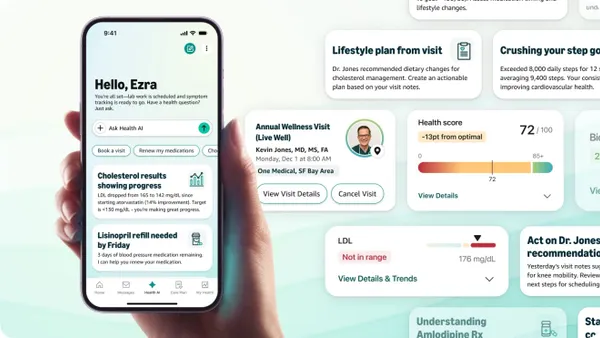Dive Brief:
- The Trump administration announced an initiative Wednesday that aims to boost health data sharing through partnerships with major healthcare and technology firms, including Amazon, Google, UnitedHealth and Epic.
- The Health Tech Ecosystem focuses on two areas: encouraging adoption of a voluntary blueprint for data sharing called CMS Interoperability Framework and increasing the availability of digital health tools, like products for chronic disease management and care navigation, the CMS said in a press release.
- More than 60 companies — including technology firms, providers, insurers and health data sharing networks — have pledged to participate in the initiative. The partnership aims to “deliver results for the American people” in the first quarter next year, the CMS said.
Dive Insight:
Interoperability and information sharing is a long-term challenge for the healthcare sector, made harder by siloed data that doesn’t easily flow between providers and a reliance on dated technology like fax machines.
Still, the industry has seen some recent progress on health data sharing. In late 2023, the Trusted Exchange Framework and Common Agreement, a governance framework for information exchange, went live after years of effort.
TEFCA launched with five Qualified Health Information Networks, or QHINs, and their number has since expanded to nine, including new additions like e-prescribing Surescripts’ data exchange and ambulatory electronic health record vendor eClinicalWorks.
Now, the Trump administration is launching its own data sharing initiative. It includes the CMS Interoperability Framework, which the agency said is a “call to action for health data networks that want to move faster.”
The framework’s criteria are supposed to be “visionary,” the CMS said. Some of the goals include ensuring patients can access their electronic medical data anywhere on the network, using apps of their choice.
Patients should also be able to access claims, explanation of benefits and prior authorizations from current and past payers, and data queries should be responded to quickly — possibly in real time, according to the CMS.
“For too long, patients in this country have been burdened with a healthcare system that has not kept pace with the disruptive innovations that have transformed nearly every other sector of our economy,” CMS Administrator Dr. Mehmet Oz said in a statement. “With the commitments made by these entrepreneurial companies today, we stand ready for a paradigm shift in the U.S. healthcare system for the benefit of patients and providers.”
AdvaMed, an influential medtech lobbying group, praised the initiative Wednesday. Shaye Mandle, executive director of AdvaMed’s Digital Health Tech division, said the “era of personalized, precision medicine is upon us,” but it requires data that can be connected across the continuum of care.
“The medtech industry is vital to the delivery of care and the improvement of patient outcomes, and we can do even more with additional tools,” Mandle said. “Access to critical information for research and development can be a challenge for medtech innovators to obtain. Greater access would promote the personalized, precise medtech design, utilization, and care patients deserve. Shared data is paramount for clinicians, innovators, and patients.”
Mandle also stressed the need to protect patient privacy within the interoperability of health systems and patient records.
Twenty-one companies have pledged to become CMS Aligned Networks, including EHR and health IT vendors like Epic, Oracle Health and athenahealth, as well as data exchanges that have received QHIN status like CommonWell Health Alliance and eClinicalWorks.
The CMS didn’t respond to a request for comment by press time on how the latest data sharing initiative will interact with TEFCA.
Additionally, eleven health systems, including Cleveland Clinic, Bon Secours Mercy Health and Intermountain Health, said they would participate in the networks. They pledged to accept patient information through digital tools to help “kill the clipboard” — or stop requiring patients to fill out medical histories on paper before visits.
Thirty companies, like Google, Apple and Samsung, joined the initiative to improve health outcomes with technology, according to the CMS.
That includes a pledge to allow patients to retrieve their health data through the network or personal apps, and then share that information with providers. Other firms signed on to use the network or apps to access health data to provide support to patients managing diabetes or obesity.















